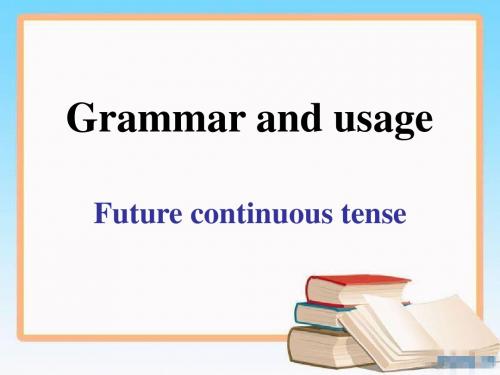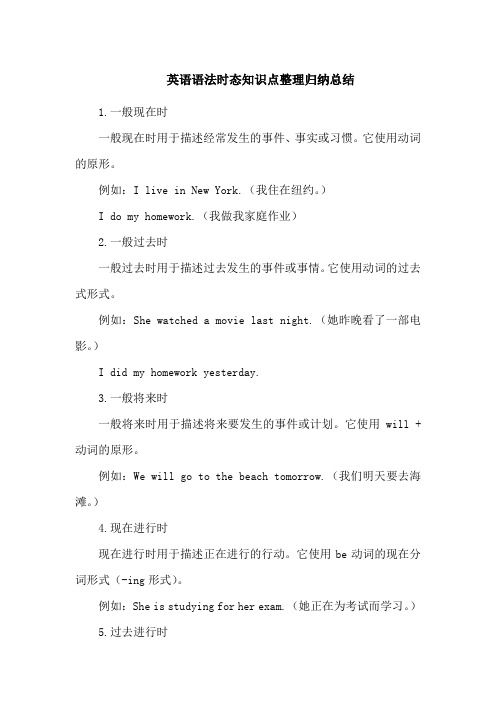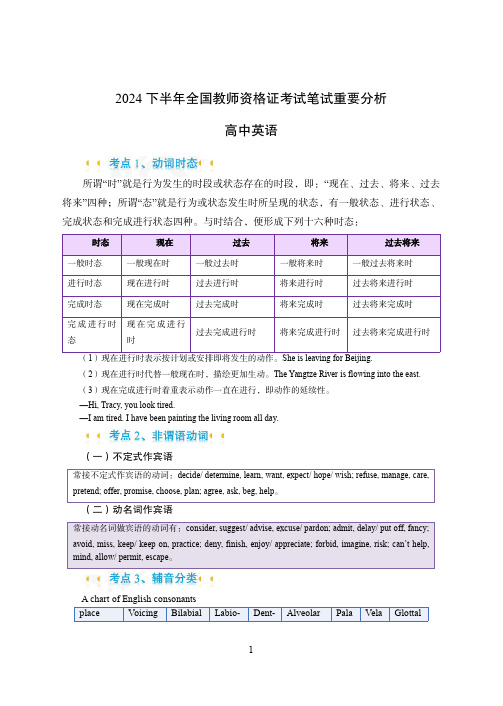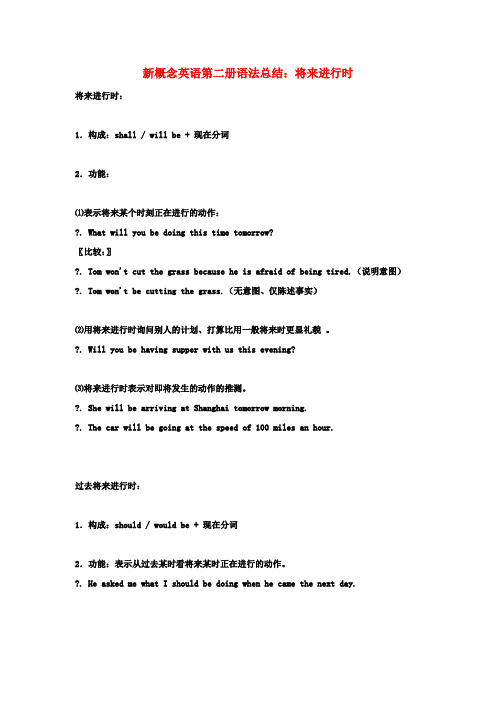福建教师招聘考试中学英语知识点《将来进行时》
高中英语知识点归纳动词的将来进行时

高中英语知识点归纳动词的将来进行时动词的时态在英语语法中起着至关重要的作用。
将来进行时是英语时态中的一种形式,用来表达将来某个时间点正在进行或即将进行的动作或状态。
在高中英语学习中,我们需要了解并正确使用将来进行时。
本文将对这一知识点进行归纳总结,并给出相应的例子。
一、构成将来进行时将来进行时的构成相对简单,只需在动词的将来时助动词“will”之后加上“be”动词的现在分词形式。
下面是具体的构成规则:肯定句:主语 + will be + 动词的现在分词形式例句:He will be studying for the exam tomorrow.否定句:主语 + will not be + 动词的现在分词形式例句:She will not be attending the meeting after school.疑问句:将助动词“will”提前到主语之前例句:Will they be playing basketball this weekend?二、将来进行时的用法1. 表示将来某个时间点正在进行的动作或状态例句:Tomorrow at this time, I will be taking an English test.翻译:明天此时,我将会正在进行一次英语考试。
2. 表示预定或计划的动作或状态例句:I will be meeting my friends for dinner tonight.翻译:我今晚将会与我的朋友们吃晚饭。
3. 表示对某个未来事件的推测或预测例句:She will be traveling to Europe next month.翻译:她下个月将会去欧洲旅行。
4. 表示对将来某个时间段内的频繁或惯常动作的描述例句:They will be going to the gym every morning during their vacation.翻译:他们在假期期间每天早上将会去健身房。
高中英语-将来进行时

had supper.
(B) was/were going to
e.g. We were going to see the wild
animals, but then we didn’t have
time. (C) was/were to e.g. It was his last day at school, and he was to leave the next morning.
2. Henry will not be able to attend the meeting tonight because ____. B A. he must teach a class B. he will be teaching a class C. he teaches a class
(D) was/were about to e.g. Colin was about to get off the camel when a child ran towards him.
用法一: 表示从过去某时间看将要发生的 动作,或存在的状态。 e.g. They were sure that they would win the final victory. (“be sure” happened in the past, the action “win the final victory” happened in the future compared with action of “be sure”)
--- Guess what, we’ve got our visas for a short-term visit to the HK this summer. --- How nice! You A a different culture then. (2010 福建) A. will be experiencing B. have experienced C. have been experiencing D. will have experienced 解析:-- 猜猜看,我们已经得到了今年夏天 去香港的短期签证 --太棒了,你到时候将会感受到不同的文化。
英语语法时态知识点整理归纳总结

英语语法时态知识点整理归纳总结1.一般现在时一般现在时用于描述经常发生的事件、事实或习惯。
它使用动词的原形。
例如:I live in New York.(我住在纽约。
)I do my homework.(我做我家庭作业)2.一般过去时一般过去时用于描述过去发生的事件或事情。
它使用动词的过去式形式。
例如:She watched a movie last night.(她昨晚看了一部电影。
)I did my homework yesterday.3.一般将来时一般将来时用于描述将来要发生的事件或计划。
它使用will + 动词的原形。
例如:We will go to the beach tomorrow.(我们明天要去海滩。
)4.现在进行时现在进行时用于描述正在进行的行动。
它使用be动词的现在分词形式(-ing形式)。
例如:She is studying for her exam.(她正在为考试而学习。
)5.过去进行时过去进行时用于描述过去某个时间点正在进行的行动。
它使用be动词的过去分词形式(-ing形式)。
例如:They were playing soccer when it started raining.(当下雨时,他们正在踢足球。
)6.将来进行时将来进行时用于描述未来某个时间点将要进行的行动。
它使用will be + 动词的现在分词形式(-ing形式)。
例如:I will be working late tomorrow.(明天我要工作到很晚。
)7.现在完成时现在完成时用于描述过去发生的一系列与现在有关的事件。
它使用have/has + 动词的过去分词形式。
例如:She has visited China twice.(她已经去过中国两次。
)8.过去完成时过去完成时用于描述在过去某个时间点之前已经完成的行动。
它使用had + 动词的过去分词形式。
例如:I had already eaten dinner when he arrived.(当他到达时,我已经吃过晚饭了。
2024下半年教师资格证笔试预测知识点-高中英语

2024下半年全国教师资格证考试笔试重要分析高中英语所谓“时”就是行为发生的时段或状态存在的时段,即:“现在、过去、将来、过去将来”四种;所谓“态”就是行为或状态发生时所呈现的状态,有一般状态、进行状态、完成状态和完成进行状态四种。
与时结合,便形成下列十六种时态:(2)现在进行时代替一般现在时,描绘更加生动。
The Yangtze River is flowing into the east.(3)现在完成进行时着重表示动作一直在进行,即动作的延续性。
—Hi,Tracy,you look tired.—I am tired.I have been painting the living room all day.(一)不定式作宾语mannerStops or plosives VL VDFricatives VL VDAffricates VL VDNasals VDLiquids VD1.同义关系(1)方言同义词指意义大致相同但有地域差异(2)文体同义词指具有相同意义但在文体上或正式程度上有差异(3)搭配同义词指在意义上相同,但在习惯搭配上有所不同(4)情感或评价有差异的同义词指词义相同,但使用时所包含的情感或态度有所不同的词2.反义关系(1)等级反义关系多为形容词,有程度的区别,对一方的否定并非对另一方的肯定。
(2)互补反义关系成员彼此互补,中间不存在过渡性,是非此即彼的关系,即否定其中一个便意味着对另一个的肯定。
(3)逆向反义关系反义关系的一种特殊类型,因为两个成员并不一定构成肯定否定的对立,而是表现在两个实体之间的一种反向关系。
3.同音/同形异义关系(1)同音异义词指发音相同但拼写不同,意义也不同的词。
(2)同形异义词指拼写相同但发音、意义不同的词。
(3)完全同音同形异义词指发音和拼写都相同但意义不同的词。
1.语法教学方法(1)The deductive method演绎法:教师首先展示语法规则并举例说明,然后由学生将所展示的语法规则运用于新的语言环境。
将来进行时的讲解及练习

将来进行时的讲解及练习Document serial number【KK89K-LLS98YT-SS8CB-SSUT-SST108】将来进行时的讲解及练习1. 一般将来时是指将来某个时间将要发生的动作和状态,基本结构是:主语+will/be going to do如:I wil/am goning to Beijing next sunday.我下个星期天将要去北京。
2. 将来进行时是指将来某个时间正在进行的动作。
基本结构是:主语+will be/be going to be +doing如:I will be sleeping at 12:00p.m. 十二点的时候我将在睡觉。
I will be studying in university at the age of 20.我20岁的时候我将会在大学里学习。
一、将来进行时用来表示在将来的某一个时间正在进行的动作①下个星期的这时候,我们将在那个工厂劳动.This time next week we shall be working in that factory.②明天下午三点,我们将正在开会.We'll be having a meeting at three o'clock tomorrow afternoon.③你将什么时候见怀特先生 (语气较委婉客气,下属对上司)When will you be seeing Mr. White④今天晚上七点,学生们将正在看电视.The students will be watching TV at seven this evening.二、将来进行时主要表示将来某一时刻正在进行的动作,或表示要在将来某一时刻开始,并继续下去的动作。
常用来表示礼貌的询问,请求等。
例如:1)This time next day they will be sitting in the cinema.用法:强调在将来的某个具体时间正在发生的动作或事情.例:Don't worry, you won't miss her. She will be wearing a red T-shirt and a white skirt at that time.别担心,你不会认不出她的.她到时会穿一件红色的T恤衫和一条白色的短裙.例:This time tomorrow you ________ there doing some more exercises.A) will sit B) will be sitting C) sit D) shall sit答案是B).因为this time tomorrow是个很具体的将来时间.三、将来进行时用来表示不含意图又未发生的动作注意:将来进行时不用于表示"意志",不能说 I'll be having a talk with her.I will be helping Mary tomorrow.明天我帮玛丽干活.这不表示说话人已安排好要帮助玛丽或者想帮助她.这个句子仅仅说明这一动作将要发生.将来进行时的这种用法有些像表示将来的现在进行时,但有以下几点不同之处.四、表示的请求When shall we be meeting again?五、与现在进行时态的区别现在进行时表示一种经过考虑的,将来要进行的动作,而将来进行时通常表示正常过程中会发生的动作,因此将来进行时不如现在进行时那样肯定,比后者偶然性要大一些:I am seeing Tom tomorrow. 明天我要和汤姆见面.I'll be seeing Tom tomorrow. 明天我会见到汤姆.第一句意指汤姆或说话人已经特意安排了这次会面,而第二句则意指汤姆和说话人将在通常进程中见面(也许他们在一起工作).不过这种差别并不是在任何情况下都很重要,而且常常两者都可以使用.现在进行时用于表示最近将来的动作时,必须有确定的时间,而将来进行时可以和确定的时间状语连用,也可以不连用.它既可以表示最近将来的动作,也可以表示较远将来的动作.可以说:I am meeting him tomorrow. 我明天和他会面.I'll be meeting him tomorrow/next year/some time/. 我明天/明年/某时将与他会面.六、与一般将来时态的区别将来进行时通常表示的是对将来事实的简单陈述.而will+V. (一般将来时)除表示时间概念外,还带有感情色彩.e.g. 汤姆明天将正在割草. Tom will be cutting grass tomorrow.汤姆明天愿意割草. Tom will cut the grass tomorrow.将来进行时专项练习一、单项填空1. The Blacks with us for the time being.A. will stayB. would stayC. have been stayingD. will be staying2. The plane at the present speed until it crosses the mountain at about ten tonight.A.would goB. wentC. will be goingD.goes3. Mr. Smith will not be able to attend the meeting tonight because ______ then.A.he must have a classB.he will be teaching a classC.he teaches a classD.he will have been teaching a class4. I won’t be able to wa tch the concert on TV tonight because I homework at that time.A. shall have doneB. shall be doingC. shall doD. have been doing5. I _______ my boss at three this afternoon.A. shall be picking upB. shall be pickedC. shall have been picking upD. shall have picked6. You can’t miss Frank. He______ a dark green suit and a yellow tie waiting for you.A. is wearingB. will wearC. wearsD. will be wearing7. ----Could you give these books to Mr. Black----Absolutely, _______him at five o’clock this afternoon.A.I will have a talkB. I have a talk withC.I can have a talk withD.I will be having a talk with8. I’m afraid I won’t be available then. I _____ a friend off at three this afternoon.A. seeB. am seeingC. will seeD. will be seeing9. Next Friday I will go to another concert .They ____some thing by Mozartat that time.A. playB. will be playingC. are going to playD. are toplay.10. ---What are you doing, Jack---Make a model plane. I ____ it in the science class at 10 o’clock tomorrow morning.A. will be showingB. am going to showC. showD. have showed11. We _____ a debate on some environmental issues all afternoon tomorrow.A. will be havingB. am havingC. am going to haveD. have12. What do you think you _____at this time next yearA .will do B. will be doing C. are about to do D. do13. ---What will you do tomorrow evening---I _____my favorite program between 8 and 11, then I will go out to drink in my usual bar.A. will watchB. am about to watchC. will be watchingD. am watching14. ---When will you come to see me, Dad---I will go to see you when you_____ the training course.A. will have finishedB. will be finishingC. are finishingD. finish15. Tom sat under a tree and seeing his friend, up in no time.A. to standB. standingC. stoodD. would stand16. I _______ very happy if I could be of some service to you.A. would beB. have beenC. must beD. can be17. The meeting was to at 9 o’clock but the manager untiltwenty minutes later.A. start; didn’t turn upB. have started; didn’t turn upC. start; hadn’t turned upD. be started; hadn’t turned up18. ---- he come to see you----Of course, please. And I’d rather he me the truth.A.Will; inform B.Shall; told C.Should; would sayD.Can; spoke19. If the building project _____ by the end of this month is delayed, theconstruction company _____ fined.A. will be completed; is to beB. to be completed; will beC. being completed; will beD. completed; was20. ---- I rang you at about ten, but no one answered the phone.---- Oh, that was probably when I _______ my neighbor.A. visitedB. was going to visitC. was visitingD. had visited21. Because I the next day, I went to bed early on Saturday evening.A. was leavingB. will leaveC. had leftD. was about to leave22. ----Henry, fancy meeting you here.----Oh, it’s you Jack. Sorry, I ______ you ______ to me.A. didn’t think; were speakingB. don’tthink; spokeC. didn’t think; would speakD. thought;are speaking23. By next summer John in this factory for thirteen years.A.has been working B.will have been workingC.will be working D.has worked24. He will have learned English for eight years by the time he __________from the university next year.A. will graduateB. will have graduatedC. graduatesD. is to graduate25. I _______________ the office when the telephone rang.A. was about to leaveB. would leaveC. leftD. was to leave26. According to their agreement reached in 1943, no country ___________peace with Germany alone.A. is to makeB. was to makeC. would makeD. was about to make27. He promised me if we_______ the game, he ________us a round of drink.A. win; will buyB. would win; would buyC. won; boughtD. won; would buy28. He said time and time again that he _________, but he actually stayed well after midnight.A. is leavingB. was leavingC. was to leaveD. will leave29. ----Mom, I got the first prize in the spelling contest.----Oh, how great! Daddy will be so proud of you. He _____ you _____ to win.A. never think; are goingB. never thought; were goingC. didn’t think; were goingD. hadn’t thought; were going30. Tom_________ to Jerry and tell him about his new school at once.A. will writeB. writesC. wroteD.writes二、用所给动词的适当形式填空1. He __________ (lie) on one of the sunny beaches in Hawaii all day when he spends his holiday there.2. Don’t call me between 2:00 and 4:00 this afternoon. I ________ (have) an test then.3. Nobody knew what ________ (happen) to the Earth in a century’s time.4. Mr. Lee said he would give the CD to me as soon as he ______ (return) from Canada.5. When we were young, father________ (take) us for a special treat on Mother’s day.6. ----Did you invite Sarah to your birthday party----Sorry, I forget. I _______ (call) her now.7. You have to put in more effort if you were _________ (pass) the test.8. I __________ (tell) you about my plan, but you stopped me before I could speak.9. Will you __________(use)your computer this time tomorrow10. I __________ (close) the kitchen door when a little mouse popped its head out.三、中译英1. 我正打算往河里跳时看见水里出现一条蛇。
将来进行时复习课件-2023届高三英语复习

计划、进行 意愿、许诺
Tell the differences.
• When will you see Mr. White? • When will you be seeing Mr. White? • Mary won’t work in this factory. • Mary won’t be working in this factory.
• In the not-too-distant future, we will live in smart homes that will lock the door for us when we are away and remember to switch off the TV when we forget.
• In the not-too-distant future, we will live in smart homes that will lock the door for us when we are away and remember to switch off the TV when we forget.
1. 将来进行时通常用于表示最近或较远的将来正 在进行的动作(搭配延续性动词)。 (to say something that will be happening in the near future or in the distant future)
The Future Progressive Tense将来进行时
because I will be playing soccer then.
2. 将来进行时通常用于将来某一时间正在进行的动 作,往往是已经计划好的。 (to say something that will be happening at a specific time in the future, usually as scheduled )
(新概念英语)高中英语 第二册 语法总结 将来进行时

新概念英语第二册语法总结:将来进行时将来进行时:1.构成:shall / will be + 现在分词2.功能:⑴表示将来某个时刻正在进行的动作:?. What will you be doing this time tomorrow?〖比较:〗?. Tom won't cut the grass because he is afraid of being tired.(说明意图)?. Tom won't be cutting the grass.(无意图、仅陈述事实)⑵用将来进行时询问别人的计划、打算比用一般将来时更显礼貌。
?. Will you be having supper with us this evening?⑶将来进行时表示对即将发生的动作的推测。
?. She will be arriving at Shanghai tomorrow morning.?. The car will be going at the speed of 100 miles an hour.过去将来进行时:1.构成:should / would be + 现在分词2.功能:表示从过去某时看将来某时正在进行的动作。
?. He asked me what I should be doing when he came the next day.测试精编1. Tomorrow, I ________ the book all morning.A. am readingB. will be readingC. will readD. have read2. -"Can you attend the meeting tonight?" -"No, ________ the manager about something urgent."A. I seeB. I'll have seenC. I'll be seeingD. I can see3. Of the millions who saw Haley's comet in 1986, how many people ________ long enough to see it return in the twenty-first century?A. will they liveB. they will be livingC. will liveD. living4. He told us that he ________ visiting Japan by this time next year.A. will beB. would beC. wasD. is5. It ________ when you wake up tomorrow morning.A. is snowingB. will snowC. will be snowingD. snows(后设答案,大家不要偷看哦~(*^__^*) 嘻嘻……)KEYS1. B2. C3. C4. B5. C。
教师招聘考试 英语专业知识—句法(主谓一致,倒装,强调)

教师招聘考试英语专业知识—句法(主谓一致,倒装,强调)教育,是增进人知识技能,发展人智力、体力和思想品德的社会活动。
知识教育的内容含义,也是我们日后成为教师要做的事情,也是我们在教育学的学习中要核心解决的问题。
在教育学基础部分,我们主要要掌握教育的相关概述,如教育现象的起源与发展,教育学的创立与发展,教育的规律等;教育的相关内涵,如教育制度,教育目的,教育的形式;教育实施中的微观内容,如教师和学生的关系,教学和德育以及班主任的管理工作等。
下面是教综考点集锦,能把这些知识点吃透,那就肯定能取得一个好成绩,离成功上岸更进一步。
主谓一致一、就近原则1.由并列结构或连词(either...or,neither...nor,not...but,not only...but also,or等)连接的并列主语,谓语动词与较近的那个名词或代词保持一致。
Neither his parents nor Tom is at home.2.在倒装句和there be句型中,谓语动词与后面的第一个主语保持一致。
There is a book and some pens on the desk.There comes the bus.3.在定语从句中,关系代词作主语,其谓语动词应与它所指代的先行词保持一致。
I know the man who is talking to my father.4.在强调句中,连接代词又在句中作主语,这时它应与被强调的主语保持一致。
It is Mary’s brother who/that was injured in the car accident yesterday.二、意义一致原则1.当主语与谓语动词之间插入along with,with,as well as,together with,besides,except,but,including等短语时,谓语动词与第一个主语保持一致。
I along with my sister am going to Shanghai next month.2.由“what”引导的名词性从句作主语时,谓语动词通常用单数形式。
- 1、下载文档前请自行甄别文档内容的完整性,平台不提供额外的编辑、内容补充、找答案等附加服务。
- 2、"仅部分预览"的文档,不可在线预览部分如存在完整性等问题,可反馈申请退款(可完整预览的文档不适用该条件!)。
- 3、如文档侵犯您的权益,请联系客服反馈,我们会尽快为您处理(人工客服工作时间:9:00-18:30)。
本文根据福建教师招考中考试大纲对中学英语的要求,梳理了将来进行时,方便同学们更加顺利地开展学习。
一、将来进行时
1.概念:表示将来某时进行的状态或动作,或按预测将来会发生的事情。
She''ll be coming soon. I''ll be meeting him sometime in
the future.
注意:将来进行时不用于表示"意志",不能说I''ll be having a talk with her.
2.构成will be+ doing
3.常用的时间状语
soon, tomorrow, this evening,on Sunday, by this time,tomorrow, in two days, tomorrow evening By this time tomorrow, I''ll be lying on the beach.
二、将来进行时与一般将来时的区别
1.两者基本用法不一样
如将来进行时表示将来某时正在进行的动作,一般将来时表示将来某时将要发生的动作。
如:What will you be doing this time tomorrow? 明天这个时候你会在做什么呢?
What willyou do tomorrow? 你明天干什么?
2.两者均可表示将来,但用将来进行时语气更委婉。
比较:
When will you finish these letters? 你什么什候处理完这些信件?(直接询问,如上司对下属)
When will you be seeing Mr White? 你什么时候见怀特先生?(委婉地询问,如下属对上司)
When will you pay back the money? 你什么时候还钱?(似乎在直接讨债)
When will you be paying back the money? 这钱你什么时候还呢?(委婉地商量)
3. 有时一般将来中的will含有“愿意”的意思,而用将来进行时则只是单纯地谈未来情况。
如:Mary won’t pay this bill. 玛丽不肯付这笔钱。
(表意愿)
Mary won’t be paying this bill. 不会由玛丽来付钱。
(单纯谈未来情况)
三、将来进行时的用法
1.表示将来某时刻或某段时间正在进行的动作。
常与soon, tomorrow, this evening, on Sunday, by this time, in two days, tomorrow evening等表示将来的时间状语连用。
如:I will be having an English class at 8 tomorrow. 我明天八点钟正在上英语课。
Mary will be working in the factory in the next two months.下两个月玛丽将在这个厂里工作。
2.在口语中常用来表示按计划或安排即要发生的动作。
如:This time tomorrow I shall be flying to New York. 明天这个时候我将飞往纽约。
At 7:00 this evening I will be watching the news programmes on TV. 今晚七时,我将正在收看电视上的新闻节目。
3.表示预料不久要发生或势必要发生的事情或将来的某种可能性,说话人往往有“我料想”或“我估计”的含义。
如:
We believe that peasants’life will be getting better and better. 我们相信农民的生活会越来越好。
If we don’t do so, we shall be making a serious mistake. 如果我们不那样做,我们就会犯严重的错误。
4.表示亲切或委婉的语气。
如:
When shall we be meeting again? 我们什么时候再见面?
以上就是福建教师招考对将来进行时的整理,希望可以对大家有帮助。
